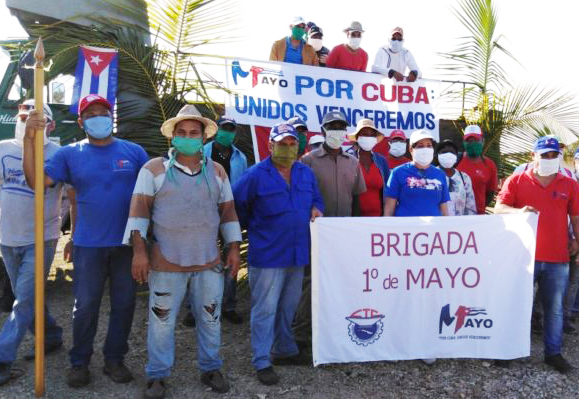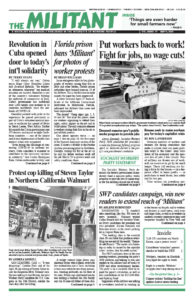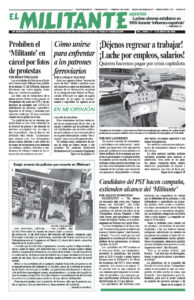“I will always say yes,” Cuban nurse Hugo César González López told Juventud Rebelde, “for whatever, whenever, wherever” our medical missions are needed. González is one of the country’s volunteers fighting the outbreak of coronavirus in Italy. Cuba’s government has mobilized over 1,000 health care workers to 18 countries worldwide since the outbreak of COVID-19.
González pointed with pride to the experience he gained previously as part of Cuba’s volunteer medical mission to eradicate the spread of Ebola in Sierra Leone, West Africa. Earlier this month the Cuban government sent 473 doctors and nurses to eight Caribbean countries — one of the largest and fastest deployments of health care workers it has ever organized.

“Even facing the challenge of containing COVID-19 in national territory, Cuba considers it essential to contribute to the necessary increase in solidarity,” José Carlos Rodríguez Ruiz, Cuban ambassador to Italy, said as a second contingent of Cuban volunteers arrived there April 13. “We provide what we can and have, not what we have left over.”
These volunteers build on decades of internationalist work by Cuba’s medical missions. “They are going to a place where they will enrich that history,” Jorge Juan Delgado, director of the Central Unit for Medical Cooperation, said at a farewell for 20 volunteers heading to Honduras April 19.
The 30,000 Cuban medical workers on missions in 65 countries are a source of confidence and pride for the country’s working people.
Unlike anywhere else in the world, the Cuban government and people are the product of a socialist revolution, carried out by millions of workers and peasants in 1959. That struggle transformed Cuba’s people — the moral values and class needs of the country’s toiling majority shape the government’s priorities. Led by Fidel Castro and the July 26 Movement, working people ousted the U.S.-backed Fulgencio Batista dictatorship and went on to overturn capitalist rule.
Working people shouldered the responsibility of running society themselves — something we are lectured is “impossible” by capitalist rulers everywhere — deepening their self-confidence, and defending themselves, arms in hand, from Washington’s unceasing efforts to restore capitalist rule.
Workers, students mobilized
The government mobilizes medical students and members of the neighborhood-based Committees for the Defense of the Revolution and of other mass organizations to systematically knock on people’s doors across the island to check if they have symptoms of coronavirus or need any help. As of April 19 they have visited 9 million of the country’s 11.2 million people. Many are visited daily. If they have symptoms, they are referred to a doctor.
“It is the duty of young people to assume responsibilities, as Cuban revolutionaries and citizens,” Indira Guevara told Juventud Rebelde. She is one of the members of the Union of Young Communists who have volunteered to prevent overcrowding in stores and markets in the Abel Santamaría neighborhood of Nueva Gerona, on the Isle of Youth. All generations in Cuba continue to be marked by the “we never leave anyone on their own” social relations established by the revolution. Young volunteers today act in line with the long record of such efforts organized by the revolution’s leadership.
Like in Nueva Gerona, the government set up a quarantine in Camilo Cienfuegos, a small town in Pinar del Rio, after cases of coronavirus were confirmed.
Initiatives to support people there include building-by-building delivery of the basic subsidized food basket provided by the government, and taking prepared meals to elderly residents. The work of regularly sanitizing the town’s streets and squares that was being carried out by workers who came from outside the area is now taken on by volunteers in the town. Laborers from nearby are covering the work of the town’s farmworkers to ensure food production continues.
In face of the spreading worldwide capitalist social crisis — met by capitalist rulers everywhere with shutdowns and mass layoffs — the revolutionary government has turned to working people to prevent an increase in shortages of basic necessities. As the planting season approaches in Camagüey province, trade union leaders initiated a voluntary work brigade for sowing cassava. With the government decision to suspend this year’s May Day parade, where hundreds of thousands march to express their determination to defend their revolution, the Camagüey unionists named their contingent the May 1st Brigade.
The U.S. rulers’ ongoing economic war against Cuba continues to challenge the government’s ability to import much-needed supplies. In March a shipment, including coronavirus testing kits and ventilators donated by Chinese businessman Jack Ma, was blocked from reaching Cuba. The Colombian airline that transported the shipment refused to deliver it, citing fear of retaliatory action from Washington.
The U.S. capitalist rulers will never stop their efforts to overthrow the revolutionary government. Cuba provides a mighty example to working people worldwide of the unlimited capacities of our class to meet whatever challenges we face — when we chart a course to take political power.

